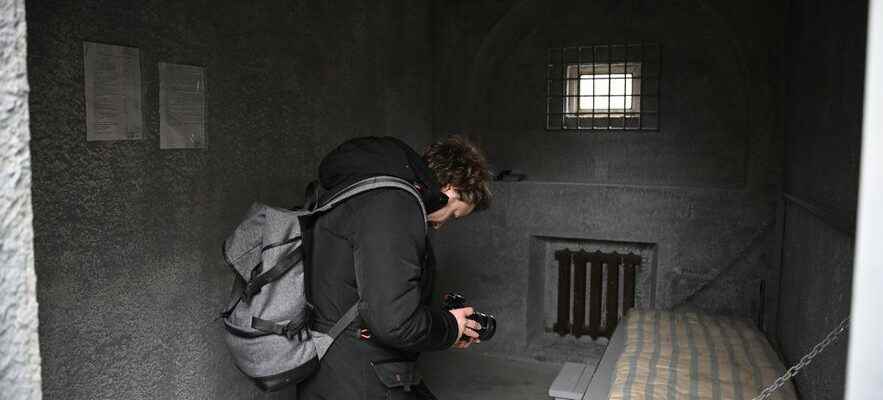What’s left, if not skin and bones? Humor, of course! It makes you wonder what wood Alexei Navalny is made of: imprisoned for two years in one of the worst prisons in Russia, thrown into the dungeon at the slightest pretext, Vladimir Putin’s public enemy no. 1 still manages to laugh about it … Over his convict diary, regularly published by his relatives, the 46-year-old opponent recounts this daily gulag of the 21st century, punctuated with “smileys”. The alarm clocks eight times a night, the ad nauseam viewing of state propaganda blaring “Glory to the FSB!” ; the neon lights lit day and night in his 3 by 2 meter cell; food deprivation; family visits canceled at the last moment by order of the authorities; the 11 stays in the hole for having washed half an hour too early or buttoned his shirt badly…
A replica of Alexei Navalny’s cell, displayed in front of the Russian Embassy in Berlin, January 24, 2023
© / afp.com/Tobias SCHWARZ
In the sadistic panoply of his jailers, the anti-Kremlin lawyer endured everything except the beating, yet far from rare behind the walls of the IK-6 colony of Melekhovo, a four-hour drive from Moscow.
In the hell of the Russian prison
“Why excite the crowds by beating him? He still has supporters, even if they no longer speak publicly. The regime prefers to subject him to ‘an ingenious torture’ aimed at killing him slowly”, underlines the historian Galia Ackerman, specialist in post-Soviet Russia. “For those it cannot hit, the Russian prison has imagined a multitude of variants, ironically the activist in his December 12 diary. The simplest is to keep the individual in a disciplinary unit. you can’t break it, so you can, for starters, throw a tramp into his cell. That’s what just happened to me. In prison jargon, we call it a ‘devil’. But let’s call it correctly: a detainee who has serious personal hygiene problems.” Never mind, the most famous convict in Russia deploys treasures of imagination to force the unclean to “wash and brush their teeth”. The administration is reluctant to provide him with winter boots in minus 15 degrees? Navalny sues.
The fellow almost 2 meters tall, with ice blue eyes, was close to 100 kilos when he set foot on Russian soil on January 17, 2021, returning from convalescence in Germany after his poisoning with Novichok, this neurotoxin of which the Kremlin has the secret. The police were waiting for him at the exit of the plane. Rapid trials and verdicts are linked: first a three-year sentence for having violated the terms of a previous conviction, then another nine years for fraud.

Since the start of his detention, Alexeï Navalny has been sent to the “mitard” 11 times
© / Artpresse
Two years of hell later, Navalny melted. Rare images captured during his court hearings bear witness to his ordeal: emaciated, gray complexion, haggard eyes. The opponent alone embodies the disastrous destiny of Russia. The face of a condemned freedom. The most influential NGOs in the country (Memorial, the Helsinki Group) have been banned, the harshest critics assassinated or imprisoned, when they have not fled. Some remain, risking their lives, like the Nobel-winning journalist Dmitri Mouratov or his colleague Alexei Venediktov, convinced of being more useful in Russia than in exile.
His fight against Putin, the “mad grandpa”
“There is neither a spirit of sacrifice nor fatalism,” said Navalny the day after his arrest. Others would have capitulated long ago. But Putin’s pet peeve of fifteen years is a badass. Before languishing in the IK-6 colony, he led all the fights against the “mad grandpa” (sic) who tyrannizes over his country. In the legislative elections of 2011 and the presidential election the following year, he openly attacked the presidential party, United Russia, renamed “party of thieves and crooks”, and mobilized thousands of demonstrators. In the process, he created the Anti-Corruption Foundation, whose YouTube channel totals tens of millions of views. Ex-president Dmitry Medvedev, the most prominent oligarchs and Putin himself are pinned down in hyper-documented investigations.
Navalny will no longer come out of Putin’s crosshairs. With regard to this man whose name he never pronounces, the president nourishes an unlimited hatred. “His troubles really began during the 2018 presidential campaign, recalls Galia Ackerman, when he began to promote ‘smart voting’ in order to encourage voters to systematically vote for the candidate with the best chance of winning. win against United Russia. There, he became dangerous. However, when Putin identifies a personal enemy, he does not let go. For him, revenge is a dish best served cold.”
A man knows something about it. 2,000 kilometers south of Moscow, former Georgian President Mikhail Saakashvili, elected in 2004 at the end of the “rose revolution” and fierce opponent of Putin, is paying the price. Imprisoned in Tbilisi for more than a year by a regime under the influence of Moscow, he is undergoing, according to his legal team, tortures from another time: traces of mercury and arsenic have been discovered in his blood.
Both seem doomed. And no mobilization of magnitude is taking shape in the West for these two martyrs, at a time when the attention of Western leaders is turned to the carnage inflicted by Putin on Ukraine. From his diary, Navalny hammers anti-war messages into his diary. But his youthful nationalist commitments and his ambiguous statements on Crimea make him a target for some defenders of kyiv. “A bogus trial,” laments an anti-Putin activist who emigrated to Germany. “Navalny is not my candidate, but any liberal should defend his release,” he pleads. Forced into exile, his relatives and his foundation continue the fight of “Alexei” against Putin and the Russian nomenklatura. He is certain of it: sooner or later, his torturer will fall.
